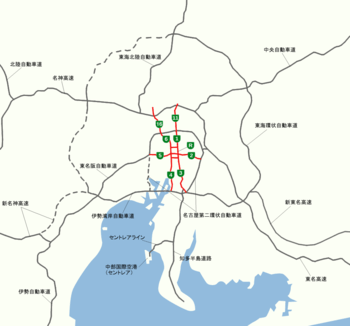Nagoya Expressway
The Nagoya Expressway (名古屋高速道路, Nagoya Kōsokudōro) is a network of urban expressways in Japan serving the greater Nagoya area. It is owned and managed by Nagoya Expressway Public Corporation.
Overview

The first section of the Nagoya Expressway network opened to traffic in 1979.[1] As of 2008, 69.2 kilometres (43.0 mi) of the network has been completed.[2]
The Ring Route at the center of Nagoya is one-way, flowing clockwise. Routes 1 through 6 extend radially from the Ring Route, with Route 2 bisecting the Ring Route. Route 4 is the only route still under construction. Routes 11 and 16 are extensions of Routes 1 and 6 respectively; a separate toll is required for these routes.
Nagoya Expressway faces competition from the expressways operated by Central Nippon Expressway Company in the greater Nagoya area. Discount policies on these expressways are much more significant than those on the Nagoya Expressway network, which leads to reduced revenue for the Nagoya Expressway and reduced efficiency of the entire road network in the region.[3]
Tolls
Fares are denominated in yen. The first value in each field applies to passenger cars and light trucks (including 2-wheeled vehicles), while the second applies to large trucks and buses.
| Nagoya Route Area | Bihoku Route Area | |||
| General | Special Areas*1 | General | Special Areas | |
| Normal | 750 / 1,500 | 550 / 1,100 | 350 / 700 | 200 / 400 |
| Sunday / Holiday / Off-peak*2 | 680 / 1,350 | 490 / 990 | 320 / 630 | 180 / 360 |
| Late-night*3 | 600 / 1,200 | 440 / 880 | 280 / 560 | 160 / 320 |
The following applies only when using Electronic Toll Collection (ETC).
- *1 Special discounted fare for vehicles using only designated short sections of the expressway network.
- *2 Special discounted fare for travel on Sundays and national holidays (all day), and between 22:00 and 0:00 every day (20:00 - 24:00 until July 31, 2008).
- *3 Special discounted fare for travel between 0:00 and 6:00 every day (0:00 to 6:30 until July 31, 2008).
References
- Ministry of Land, Infrastructure and Transport. "History of the Expressway Network in the Greater Nagoya Area". Archived from the original on 2008-03-28. Retrieved 2008-04-17.
- "Nagoya Expressway Route Map". Retrieved 2008-04-18.
- "On the Effects of Central Japan Expressway's Commuter Toll Discount Policy in Nagoya Area" (PDF). Archived from the original (pdf) on 2011-07-07. Retrieved 2008-04-18.